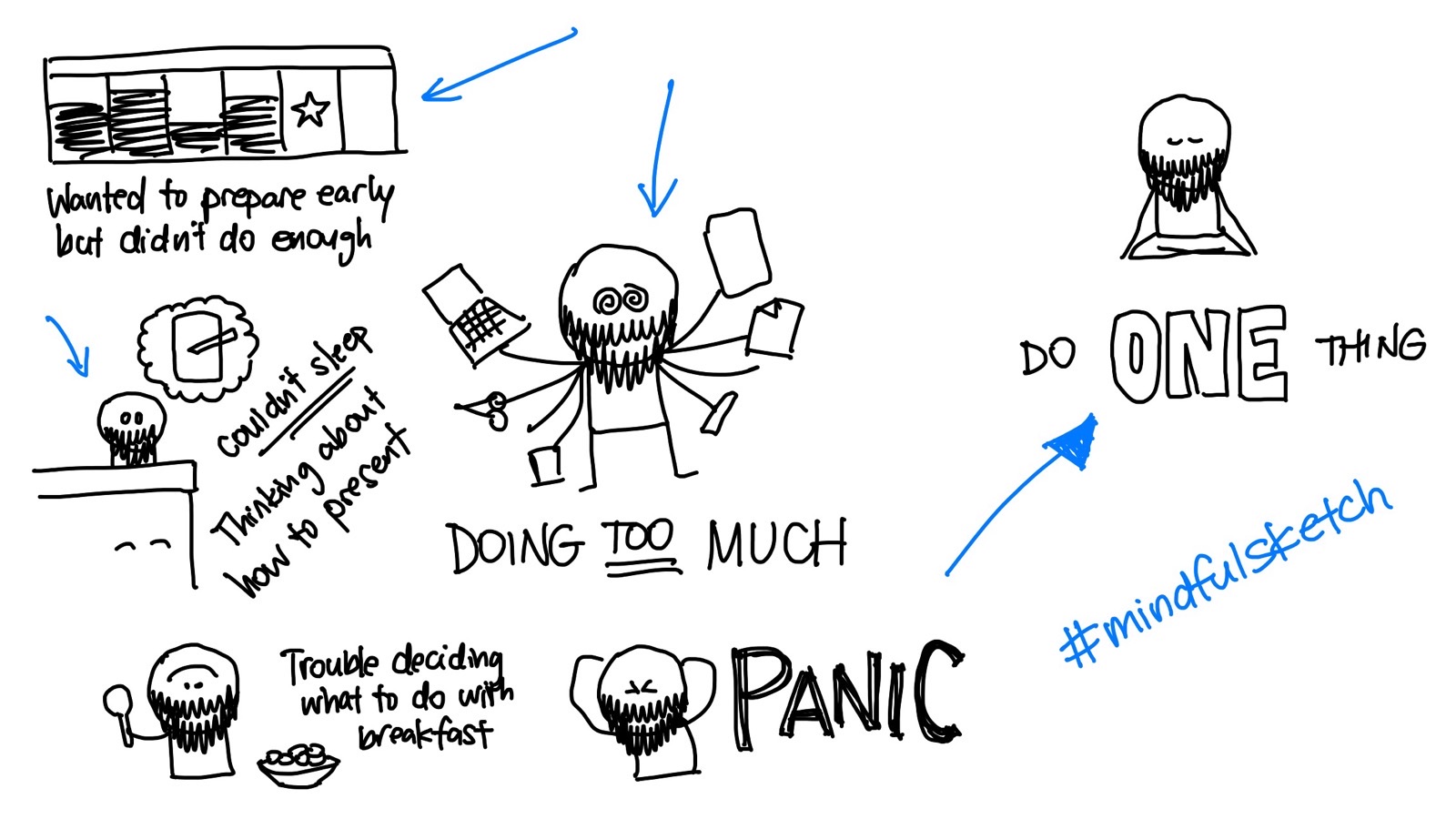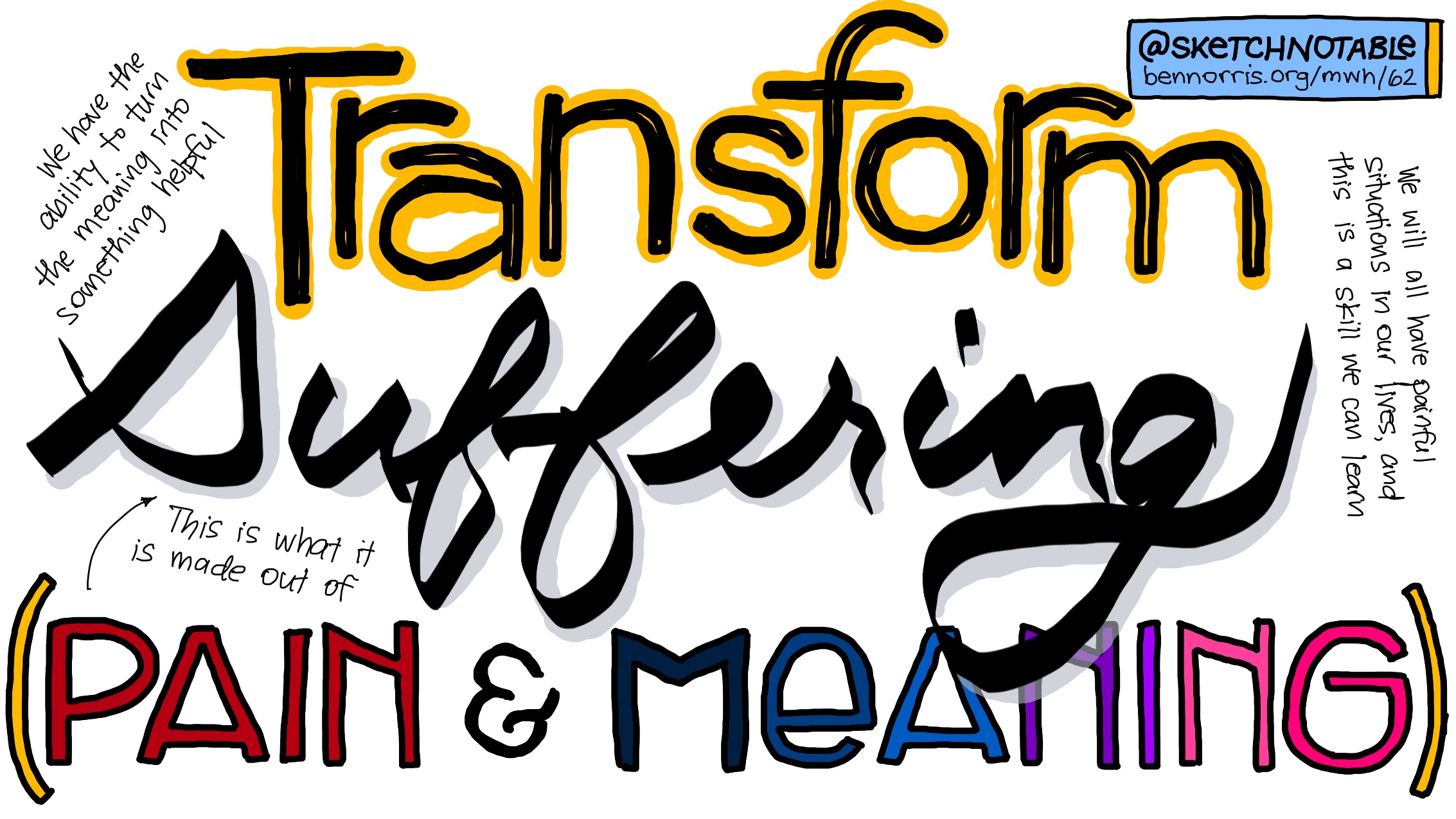This update shares the story of the meditative sketchnoting workshop from last week, and how I tried to turn painful emotions into helpful tools for myself and others.
These weekly updates share life with OCD as part of my Mental Work Health project to reduce stigma around mental health, especially at work.
So. Many. Emotions. As the day drew closer, all the feelings threatened to pull me down and drown me. I had been building toward this for months, but the last few weeks flew by in a blur. “I might just have to cancel. I’m not ready. I don’t feel good enough. I’m going to let people down. I don’t know if I can do this.”
Story
Over the summer, Mike Rohde and I talked for the Sketchnote Army podcast. We discussed my journey to sketchnotes and the role they play in my life now. One of the themes that came out of our discussion was a connection with mental health. I told him that I see sketchnotes as a sort of meditative practice. To do it well, you have to be focused and present and stay in the moment.
Mike reached out to me after the interview and floated the idea of doing a workshop together to teach people about sketchnotes as a meditative practice. We planned to talk more about it in the fall and pull something together. In September, I wrote about an experience of using sketchnotes to calm a panic attack and process my emotions. Mike reached out again and we scheduled some time and started planning.
We came up with an outline of an event that leveraged both of our experience and that we thought could be helpful for people. Even just meeting with Mike was a great boost for me, and the chance to work together with him was exciting.
As the date grew closer, I told him that I hadn’t been able to prepare as much as I wanted to and asked if we could postpone some more. His response was so kind and gracious, and helped quell some of the mounting anxiety.
When we announced the workshop, the response was overwhelming. We had a limited capacity, and it filled up in under a day. I wrote last week about some of the mix of emotions I was feeling at that point.
The night before our workshop, I wanted to go to bed early. But I laid awake in bed trying to figure out the best way to present from my iPad over Zoom. There were pros and cons for every option that I considered, and my mind would not let go. My OCD insisting on seeking the “right” solution.
The morning of, I had set aside extra time to relax and do last minute preparation. But I still couldn’t let go of trying to find the best approach, and spent a couple more hours trying things out.
My wife had made me some breakfast, and I texted to ask her if I should warm it up. Then I asked how long. When I lose the ability to make small decisions like that, it is a clear signal to us that OCD is taking over. Just as we have discussed in my treatment, my wife gently refused to tell me what to do. I knew it was the healthy and helpful thing to do, but I just started crying.
In the last few minutes before the workshop, I had all sorts of plans for how I wanted to relax and prepare. I was going to do some free writing and clear my mind. I was going to meditate for a few minutes to relax. In the end, I ran out of time for almost everything. I did a Breathe session on my Apple Watch for a couple minutes to try and calm down a bit.
And then it was time.
The workshop itself went really well, I thought. It was clear that Mike has run many sketchnoting workshops, and our preparation paid off for a smooth flow. There were still a number of technical issues, but no major detractors from the overall experience.
As part of the workshop, we invited the participants to join in creating a sketchnote about how they were feeling right then. We also did one, and I shared mine.

It was a moment of vulnerability for me as I was not happy with the output of the sketchnote. My anxiety was so high that it was hard to write or draw, and I was just dumping my emotions out a bit. But that was exactly the point of the exercise.
From comments people made at the end and after the event, it seemed that it was helpful to many. We shared both a theoretical approach to look at situations, and some practical skills that people could try out. We recorded the workshop, and the video is available for anyone to watch. It felt like a great success.
Lesson
One principle that we discussed often in my intensive outpatient program for OCD is the difference between pain and suffering. We are all going to feel pain—that is part of life. There will be physical and emotional pain that experience.
But suffering is all about the meaning that we attach to the pain. We can choose to sit in a painful experience and allow it to be without imbuing it with extra meaning that makes it worse.
One of the most common ways that my pain becomes suffering is when I tell myself that the pain represents failure. I am not good enough. I am not doing things right. I am letting people down.
This workshop that we ran was an exercise in transforming suffering. I took some of my painful experiences, and tried to give them new meaning. As I worked to employ different tools to cope with them, I experimented and found things that helped. And then I shared those.
It felt great.
Challenge
As we get into the traditional holiday time of the year, it is common to have difficult situations come up. For many of us, time with family is fraught with emotions. My challenge to me, and to you if you will accept, is to transform some suffering.
When you notice that you are hurting, turn inward for a moment. Allow yourself to fully feel the emotions you are having. And then be curious. What meaning are you attaching to your experience? What other meanings could there be?
See if you can find a way to sit in your distress without judging it. Tell yourself some kind words. Hold some compassion.
And, if you can, share it with someone else.

